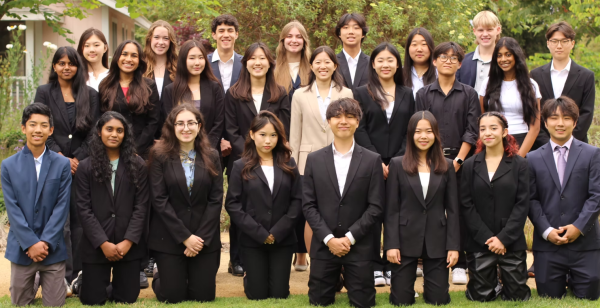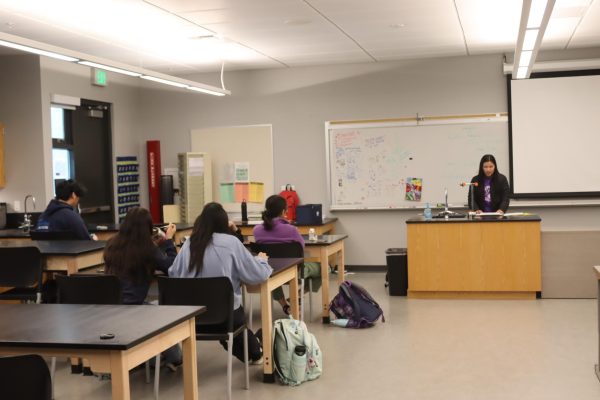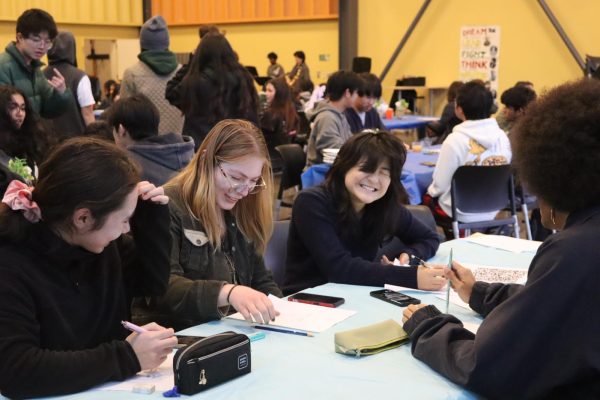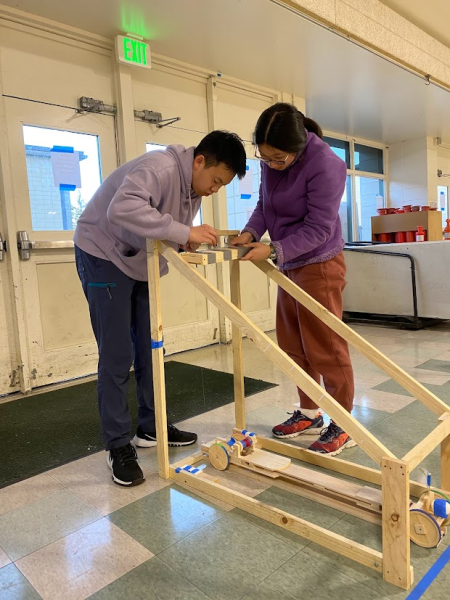Learning during COVID-19
Students around the world and at HHS elaborate on their school experiences during these times
The ongoing pandemic has affected Bay Area schools in many ways, but it has also altered the education of students living in other parts of the world. Osnat Ziv is attending an in-person school in Leeds, England and she said in a Zoom interview she has differing thoughts about it.
“A lot of stuff happened over quarantine, but I’m glad I get to see my friends again. For me, I work better at home, on my own,” Ziv said. “In school, there are too many distractions.”
The homework load has also changed dramatically for many students. Living and studying in Grenoble, France, Adele Noiret said in a Zoom interview the school system in America is very different from the one in France. The country has decided to have all students go to school in person, which has consequently created more work for students.
“Well, [when the pandemic began] it was just our online classes,” Noiret said. “So in all, we had a lot less work … now, we have a … lot more work.”
According to Pew Research Center, 61% of American teenagers report feeling pressure about their grades and 29% feel the pressure to look good in front of their peers.
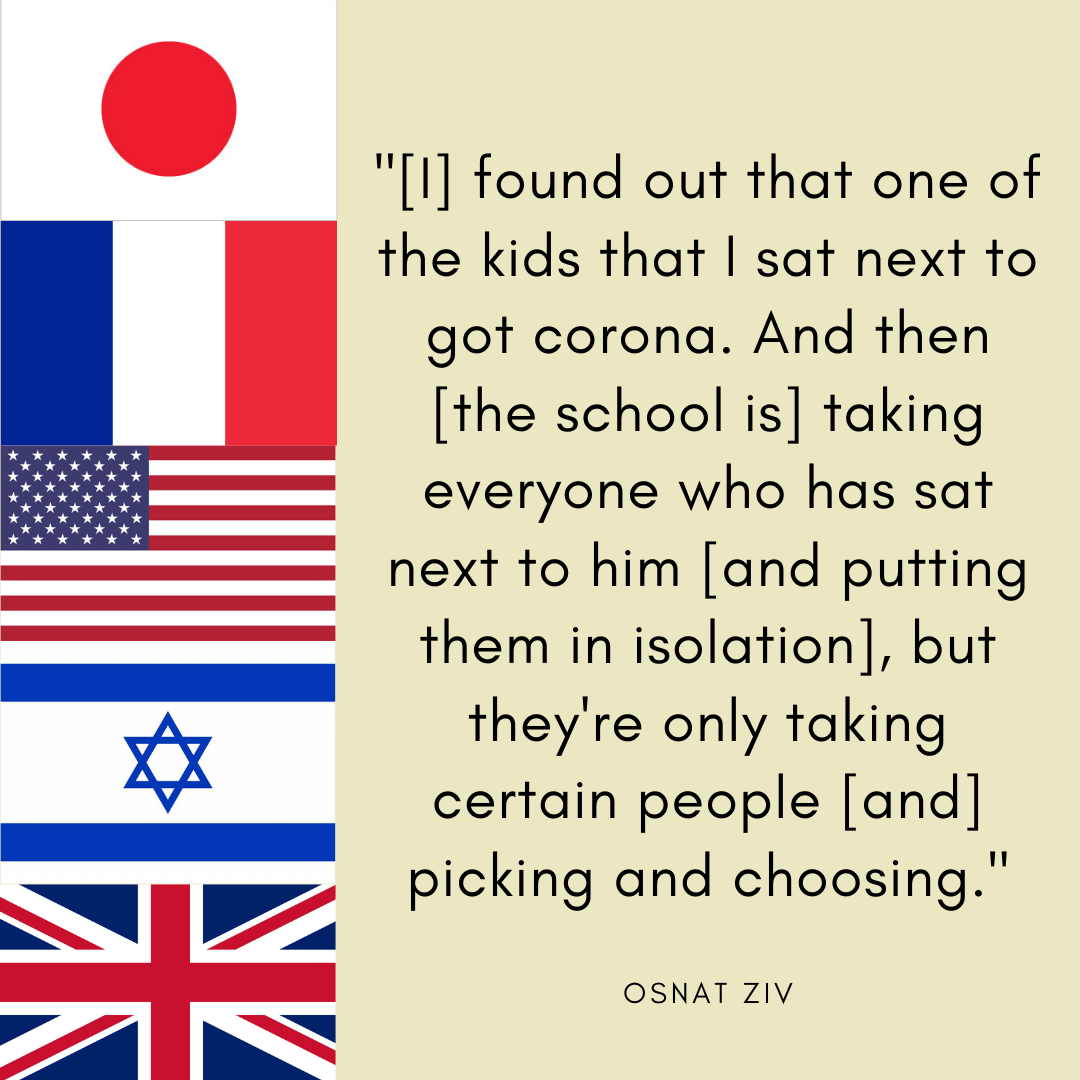
In France, students also feel the same stress to do well in school, Noiret said. Transitioning from online to in-person learning was a big change and the worries came back once again, she said. The continuous stress has caused reactions from students that are not always positive.
“I thought that online school is stressful. It’s not … I have friends [now] who have panic attack[s],” Noiret said. “They have panic attacks [from the stress that comes with the workload] during the day and everything.”
Another big concern that comes with going to school in-person are the health risks, Ziv said. Ziv said she he has family members in the same household who are at risk and have pre-existing medical conditions, and she believes her school could be doing a better job of ensuring the safety of students.
“[I] found out that one of the kids I sat next to got Corona,” Ziv said. “And then [the school is] taking everyone who has sat next to him [and putting them in isolation], but they’re only taking certain people [and] picking and choosing.”
Despite the health risks, Sae Nakamura sais she is enjoying the way her school has decided to approach the pandemic. Nakamura is currently learning in-person in Kanagawa, Japan, she said in an email.
“I’m happy since it’s really hard for me to concentrate at home looking at the computer,” Nakamura said. “And also it is required for student[s] to wear a mask [at school], so I feel okay with the safety.”
While this may be true for Nakamura specifically, she said some of her peers feel scared about attending school in person. However, she said she thinks there is nothing more that can be done about it.
Rather than adopting an in-person learning approach, some schools have shut down completely while their countries are still in lockdown.
Naama Zach said in a Zoom interview that she is doing online classes in Pardes Hanna-Karkur, Israel.
“There’s no [return] date,” Zach said. “We don’t have a date when we’re supposed to go back to school.”
Learning in an informal environment does not create a sense of formality that a real school does for Zach. This makes it harder to stay focused and on-track.
“I guess there’s much less pressure, which is an advantage, and a disadvantage because I don’t really feel the need to turn in my work on time,” Zach said.
HHS sophomore, Joss Broward said in a Zoom interview that he feels the workload is much greater now with online learning.
Before distance learning, he would get one to two hours of homework a day, Broward said, but now it is two to three hours.
Distractions during learning are a big problem that many students face when there is no teacher enforcing rules, Zach said. Looking at phones, playing games, or just browsing the internet are all a few examples.
“It’s a lot harder to learn in front of a computer because then I’d always be distracted by something and I could, in reality, just turn off the camera and the microphone and be on my phone,” Zach said.
Broward and Zach both said they would be doing better in school if classes met in person.
“I definitely thrive in in-person learning much more,” Broward said. “[It is helpful] to have more hands-on activities and things like that, and you can work with your peers more, and usually, you get more help in general.”
Despite this, Zach said she still believes distance learning has advantages. Some of them include more freedom during class time and the choice of how to dress.
“[If] I don’t want to get up from my bed or something,” Zach said, [or if] I’m really tired, I don’t have to get ready. I can just be chill in my pjs which is very comfortable, and it’s just nice that I can take my time.”
Additionally, Broward said the structure of learning and HHS’s system for schoolwork is simpler.
“It’s much easier to navigate. It’s not as complicated” Broward said. “Organization is a lot easier [with] online school.”
At the end of the day, everyone has been using different resources to deal with the pandemic and new methods of schooling. Zach said friends have helped tremendously by providing support in these challenging times.
“I have a friend that lives really close to me. So we can just learn together and I guess that kind of helps me with learning because learning alone is kind [of] hard,” Zach said. “I rely a lot on my friends during this time. I don’t know what I would [do] without them.”
Lia is a senior and she is excited to be entering her third year in The Epitaph. As the Senior Lifestyles section editor, she sheds light on the life experiences...



